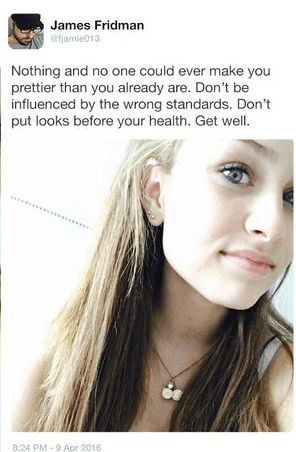James Fridman, a Twitter artist who specializes in satirical Photoshopping was asked by a young woman in the tweet above to “make her look pretty,” supplying a selfie for the “before” shot.
Here is what Fridman tweeted back:
Nice.
_______________________________
Pointer: The Blaze


Indeed.
So many people would be tempted to send a picture of a skeleton.
It’s a kind enough reply, but given the questioner (assuming it’s her), I am not assured that she is going to respond as if it was kindness. She might worsen.
There is only so much a guy on the internet can and should do for a teenage girl he has never met in person
No argument with you Rich. I was only commenting on persons’ unpredictability, and the eternal risk of unintended consequences.
Isn’t that just the “better not make a Mohammad cartoon lest the Muslims react maliciously” argument? Are we accountable for someone else’s reaction to our otherwise ethically neutral conduct?
In any case, a negative response is unlikely. The most likely scenario is that what the young lady said is face value; i.e., she really does have low self-esteem and an eating disorder. VERY low-probability unintended consequences should never deter you from making an ethical…or kind…response.
Tex: (1) Maybe, and (2) sometimes.
What are you trying to do – radicalize me?
Am I the only one who gets the feeling the young woman in the picture is one of those attention-craving people that has to say how ugly they are, just to hear everyone tell them how beautiful they are?
Regardless, it was a classy answer.
There IS a bit of the come-hither look in her mascaraed eye, which makes Fridman’s reply all the more useful. It occurred to me, since he answered far more (and more valuably) than just the reassurance asked for, that he may have consulted with a physician or psychologist before twittering back. The “get well” placed as a direction rather than a Hallmark hope, was perfect.
That misses the whole point. As a comedian/artist, he had no particular obligation to address the issue. His shtick is silly interpretations of requests, usually with a gentle slap to people’s ego.
That he took a moment to reassure a fan that she was fine just the way she was goes above and beyond. You do not need medical training to do this. It is “heroic” specifically because he is a ordinary Joe.
We are so risk adverse, that offering complements without professional consultation seems unthinkable…
The internet is one of the few “not-safe places”; the wild, wild west. Indulging her when she admitted to an eating disorder could be dangerous, and the average adult should realize this. James would have been perfectly in his ethical right to simply delete or ignore the request. He chose to respond with compassion instead. There is a slight risk that the message might not be well received, and it takes courage to accept that risk; but ultimately if a girl is too fragile to receive a complement, it is her duty (or her parent’s) to stay off the internet. We cannot let irrational fear defeat compassion.
I don’t agree: “Nothing could make you [prettier, smarter, whatever] than you are” is neither encouragement nor a measure of her attractiveness or lack of it; says, in effect: stop where you are and be okay with it. It is not a compliment, but an intelligent and gentle instruction. Anyone would be correct in saying it to someone anorexic. Same with assuming she is getting bad advice, setting wrong goals, whether from magazine covers, television, or one of the dozens of renegade Anorexia-is-Beautiful websites that does encourage people to starve themselves … often to death …, and tell them how. (One of the few things Facebook has done right, or done at all, is to ban them). And “Get well” couldn’t be clearer: it is something you say when someone is sick. Put all together, it is an efficient bit of counseling for whoever reads it.
This seems fishy to me. She’s very good looking and made up within an inch of her life. Something about the whole thing doesn’t add up.
Candidly, I agree, but you have to fight cynicism sometimes.
I do all the time.
I see your point, but we have such a small slice of her life that it is impossible to discern anything. It could be a healthy photo from before her disorder became acute that she aspires to return to. It could be entirely attention whoring. No way of knowing.
I don’t see that it matters if she’s a complete fake. Fridman was tweeting to a larger audience (he’s making a living out of this, isn’t he?). That’s how the “best” agony-aunts got their information and advice across to the general public in print. People read their columns avidly, not caring about the troubled writers so much as the troubles themselves and how Dear Abby or Ann Landers was going to solve them. … not saying that Fridman is at that level, but he’s in the ballpark.
To some extent, I have to agree with you. Making a diagnosis on the basis of a short statement on the internet along with a (possibly) faked picture is dangerous, at best. Offering a one-paragraph treatment regime is also dangerous. However, with the information he had on hand, he did ok, and the very best he could do, given the circumstances. The response was compassionate, and tried to put a little reality into the mix.
Thank you. It’s always helpful to have clinical amplification. That’s it, in perspective.
Here is a blog post from Jessica Davin, nee Weiland, regarding anorexia.
That only frightens hell out of uninformed mothers of anorexics. If anything, it’s a harmful way to deal with any — what can I call it? — belief system. Scary pictures and death warnings didn’t help stop-smoking campaigns either. That’s why you don’t see them any more.
I would add that I seriously doubt that ANYBODY finds anorexia funny, except, perhaps, an ignorant, sadistic idiot. Karen Carpenter died from it.
The funniest, most horrible, black comedy moment in the beauty contest spoof “Drop Dead Gorgeous” is in fact an anorexia gag. I think it is brilliant, like the whole film, but it is not for everybody.
Wow.